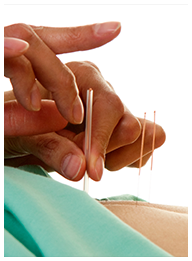What Is Acupuncture
 Acupuncture is a therapeutic method used to encourage natural healing, reduce or relieve pain, and improve function of affected areas of the body. Acupuncture is safe and effective and is often successfully used as an alternative to medications or even surgery. Relief is often obtained even where traditional medical therapy has failed.
Acupuncture is a therapeutic method used to encourage natural healing, reduce or relieve pain, and improve function of affected areas of the body. Acupuncture is safe and effective and is often successfully used as an alternative to medications or even surgery. Relief is often obtained even where traditional medical therapy has failed.
Acupuncture involves the insertion of very fine needles through the skin and tissues at specific points on the body. There is no injection of any substance and the treatment itself causes minimal discomfort.
Classical acupuncture was developed in China as a system of diagnosing and treating pain and disease. Although proven successful for hundreds of years without the benefit of modern medical knowledge, Western Science has now begun to study acupuncture to understand and explain its effectiveness.
Modern technology has allowed variations in acupuncture treatment. Electro-acupuncture involves stimulation of inserted needles with gentle electrical impulses. Rubber electrodes or moistened cotton-tipped applicators can also be used to deliver electrical stimulation to acupuncture points (transcutaneous electrical nerve stimulation, or T.E.N.S. – the “Dr. Ho machine” – is a variation of the same principle). Low power laser may also be used instead of needles to stimulate appropriate points.
How Does Acupuncture Work?
Acupuncture stimulates the body to produce its own pain-relieving chemicals, called “endorphins”. These chemicals mimic morphine by attaching to opiate receptor sites found throughout the nervous system. Endorphins help block pathways that relay pain messages from the body to the brain, resulting in the relief of pain, general relaxation, and biochemical restoration of the body’s own internal regulation systems.

The improved energy and biochemical balance produced by acupuncture stimulates the body’s natural healing abilities, reducing inflammation, and promoting physical and emotional well-being.
How is Acupuncture Used Today?
Acupuncture is very effective in treating a variety of painful disorders, both acute and chronic.
The World Health Organization has identified the benefits of acupuncture in the treatment of a wide range of medical problems including:
Digestive disorders: gastritis, hyperacidity, spastic colon, constipation, diarrhea
Respiratory disorders: sinusitis, bronchitis, asthma
Neurological and muscular disorders: headaches, neck and back pain, neuralgia, frozen shoulder, tennis elbow, tendonitis, sciatica, arthritis
Urinary, menstrual and reproductive disorders
Addictions, insomnia
Pain control and sports injuries
In treating any illness or affliction, a correct diagnosis is important before any decisions are made regarding therapy. Once the diagnosis is established, a qualified practitioner can advise whether acupuncture is appropriate.
Are There Any Adverse Effects or Risks to the Treatment?
One of the most striking aspects of acupuncture is the almost complete absence of side effects and complications from its use. Most patients find that the treatments are relaxing and cause minimal discomfort. Bruising may occur in rare cases.
Patients with pacemakers should avoid electrical stimulation unless approved by their cardiologist. Women in early pregnancy and haemophiliacs should be treated with caution.
The WHO recommends that only sterile disposable needles be used, preventing any risk of infection. In particular, there is no possibility of transmission of the AIDS or hepatitis viruses when sterile disposable needles are used.


